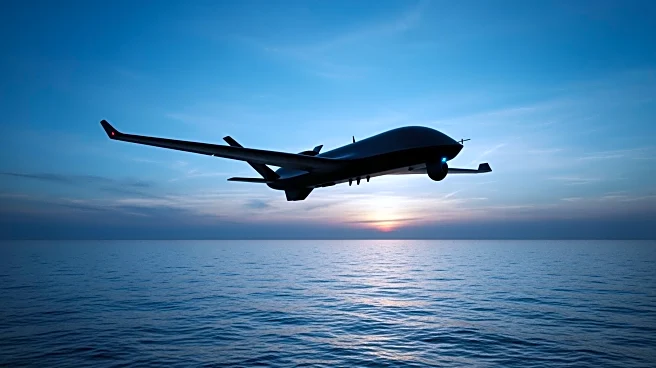What's Happening?
The U.S. Marine Corps has temporarily deployed a unit equipped with MQ-9A Reaper drones to the South China Sea to support Philippine forces amid ongoing clashes with Chinese vessels. The deployment, requested by the Philippine government, aims to enhance
regional maritime security through shared domain awareness. The drones are unarmed, emphasizing the mission's focus on surveillance and reconnaissance rather than combat. This move is part of broader Pentagon efforts to bolster the Philippines' maritime capabilities in response to aggressive actions by Chinese vessels, including the use of water cannons against Philippine fishing boats and confrontations with the Philippine coast guard.
Why It's Important?
The deployment of Reaper drones signifies a strategic U.S. commitment to maintaining stability in the Indo-Pacific region, particularly in the contested South China Sea. This area is crucial for international trade routes and regional security, with multiple nations asserting territorial claims. The U.S. action supports the Philippines, a key ally, in safeguarding its maritime interests against Chinese assertiveness. The presence of U.S. military assets may deter further aggressive maneuvers by China, potentially reducing the risk of escalation. Additionally, the deployment underscores the U.S.'s broader strategy to counterbalance China's growing influence in the region.
What's Next?
The temporary deployment of the Reaper drones could lead to further military collaborations between the U.S. and the Philippines, including infrastructure developments like the planned fast boat facility in Palawan. This facility will enhance the Philippines' patrol capabilities in the South China Sea. The situation may prompt diplomatic engagements among regional stakeholders to address territorial disputes and maritime security. The U.S. may continue to adjust its military presence in response to evolving threats, potentially increasing its permanent assets in the region, as evidenced by the establishment of a Reaper unit in South Korea.
Beyond the Headlines
The deployment highlights the ethical and legal complexities of using unmanned aerial vehicles in international waters, especially in disputed territories. It raises questions about sovereignty, the rules of engagement, and the balance between surveillance and aggression. The situation could influence long-term geopolitical dynamics, affecting U.S.-China relations and regional alliances. The use of drones also reflects technological advancements in military strategy, emphasizing the role of unmanned systems in modern warfare.















